 |
InfiniSQL
v0.1.2-alpha
Massive Scale Transaction Processing
|
 |
InfiniSQL
v0.1.2-alpha
Massive Scale Transaction Processing
|
create object to tokenize, parse, and compile SQL statement More...
#include <Larxer.h>
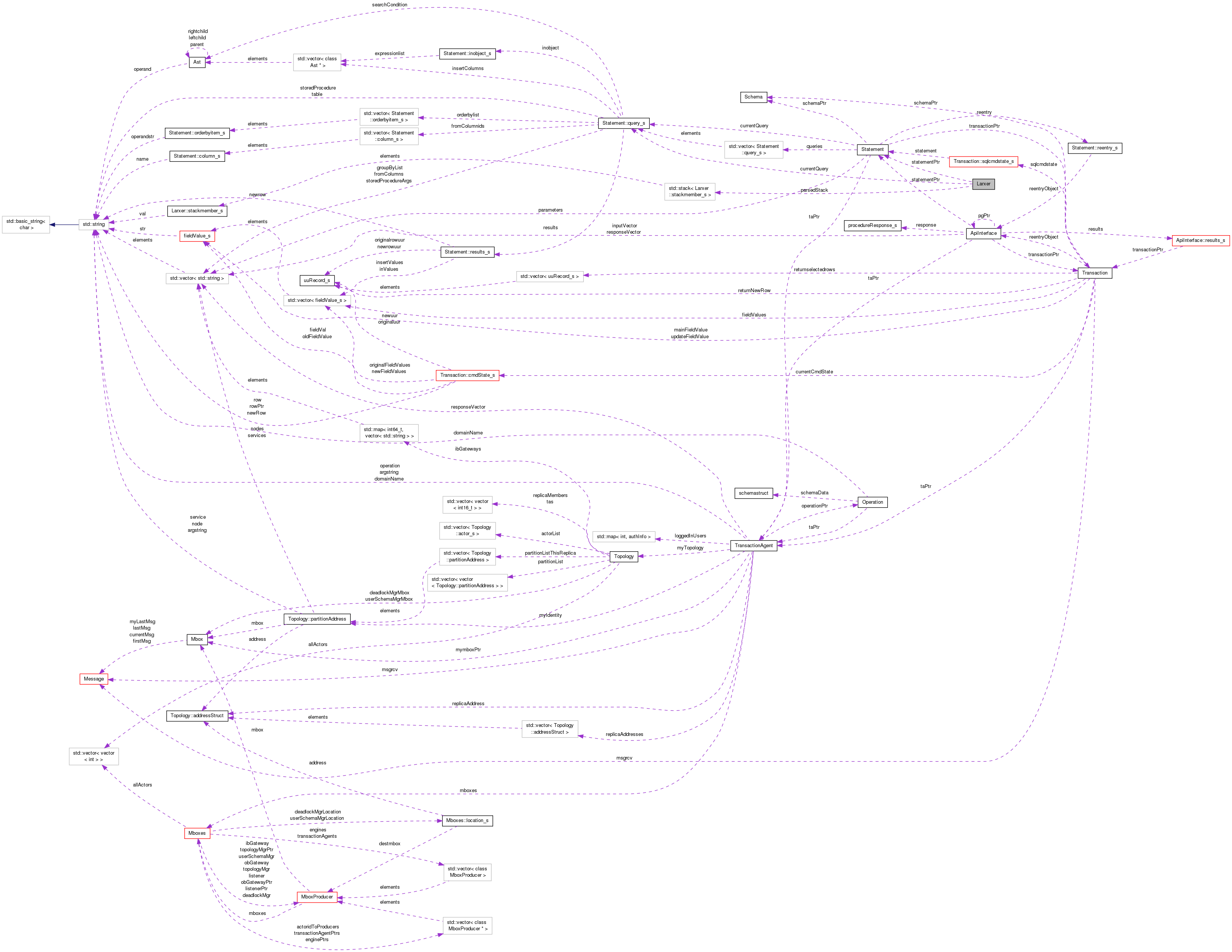
Classes | |
| struct | stackmember_s |
| data populatng pre- Ast stack. SQL token and associated value. More... | |
Public Member Functions | |
| Larxer (char *instr, class TransactionAgent *taPtr, class Schema *schemaPtr) | |
| tokenize, parse, and compile SQL statement More... | |
| virtual | ~Larxer () |
| void | pushstack (stacktypes_e type) |
| put item on stack More... | |
| void | pushstack (stacktypes_e type, int64_t val) |
| put item on stack More... | |
| void | pushstack (stacktypes_e type, long double val) |
| put item on stack More... | |
| void | pushstack (stacktypes_e type, const char *val) |
| put item on stack More... | |
| void | pushstack (stacktypes_e type, string &val) |
| put item on stack More... | |
| void | pushoperand (char operandtype) |
| push operand onto stack More... | |
| void | pushoperand (char operandtype, int64_t val) |
| push operand onto stack More... | |
| void | pushoperand (char operandtype, long double val) |
| push operand onto stack More... | |
| void | pushoperand (char operandtype, const char *val) |
| push operand onto stack More... | |
| void | pushaggregate (char aggregatetype, const char *val) |
| push aggregate and associated field onto stack More... | |
| stackmember_s | popstack () |
| take item off stack More... | |
| int64_t | getintval (string &val) |
| convert string to integer More... | |
| long double | getfloatval (string &val) |
| convert string to float More... | |
| void | eatstack (class TransactionAgent *taPtr, class Schema *schemaPtr) |
| consume entire stack More... | |
| void | printstack () |
| show stack entries, for debugging More... | |
| void | consumeSelect (string &columns) |
| extract SELECT query from stack More... | |
| void | consumeInsert () |
| extract INSERT query from stack More... | |
| void | consumeUpdate () |
| extract UPDATE query from stack More... | |
| void | consumeDelete () |
| extract DELETE query from stack More... | |
| void | consumeStoredProcedure () |
| extract stored procedure call query from stack More... | |
| class Ast * | consumeExpression () |
| extract expression from stack More... | |
| int64_t | consumeSubquery () |
| extract subquery from stack More... | |
| void | consumeInobject () |
| extract list of IN values from stack More... | |
| void | consumeColumns (int64_t numcolumns) |
| extract columns from stack More... | |
| void | consumeFrom () |
| extract FROM clause from stack More... | |
| void | consumeWhere () |
| extract WHERE clause from stack More... | |
| void | consumeGroupby () |
| extract GROUP BY clause from stack More... | |
| void | consumeHaving () |
| extract HAVING clause from stack More... | |
| void | consumeOrderby () |
| extract ORDER BY clause from stack More... | |
Public Attributes | |
| std::stack< stackmember_s > | parsedStack |
| class Statement::query_s * | currentQuery |
| class Statement * | statementPtr |
create object to tokenize, parse, and compile SQL statement
many of these functions are called by the lexer.ll and parser.yy generated code
| instr | SQL query |
| taPtr | TransactionAgent |
| schemaPtr | Schema |
| enum Larxer::stacktypes_e |
SQL tokens for pre- Ast stack.
Definition at line 56 of file Larxer.h.
| Larxer::Larxer | ( | char * | instr, |
| class TransactionAgent * | taPtr, | ||
| class Schema * | schemaPtr | ||
| ) |
tokenize, parse, and compile SQL statement
many of these functions are called by the lexer.ll and parser.yy generated code
| instr | SQL statement |
| taPtr | TransactionAgent |
| schemaPtr | Schema |
Definition at line 34 of file Larxer.cc.
References eatstack(), flexbuffer(), flexdestroy(), flexinit(), perlarxer::larxerPtr, parsedStack, perlarxer::scaninfo, statementPtr, and yyparse().
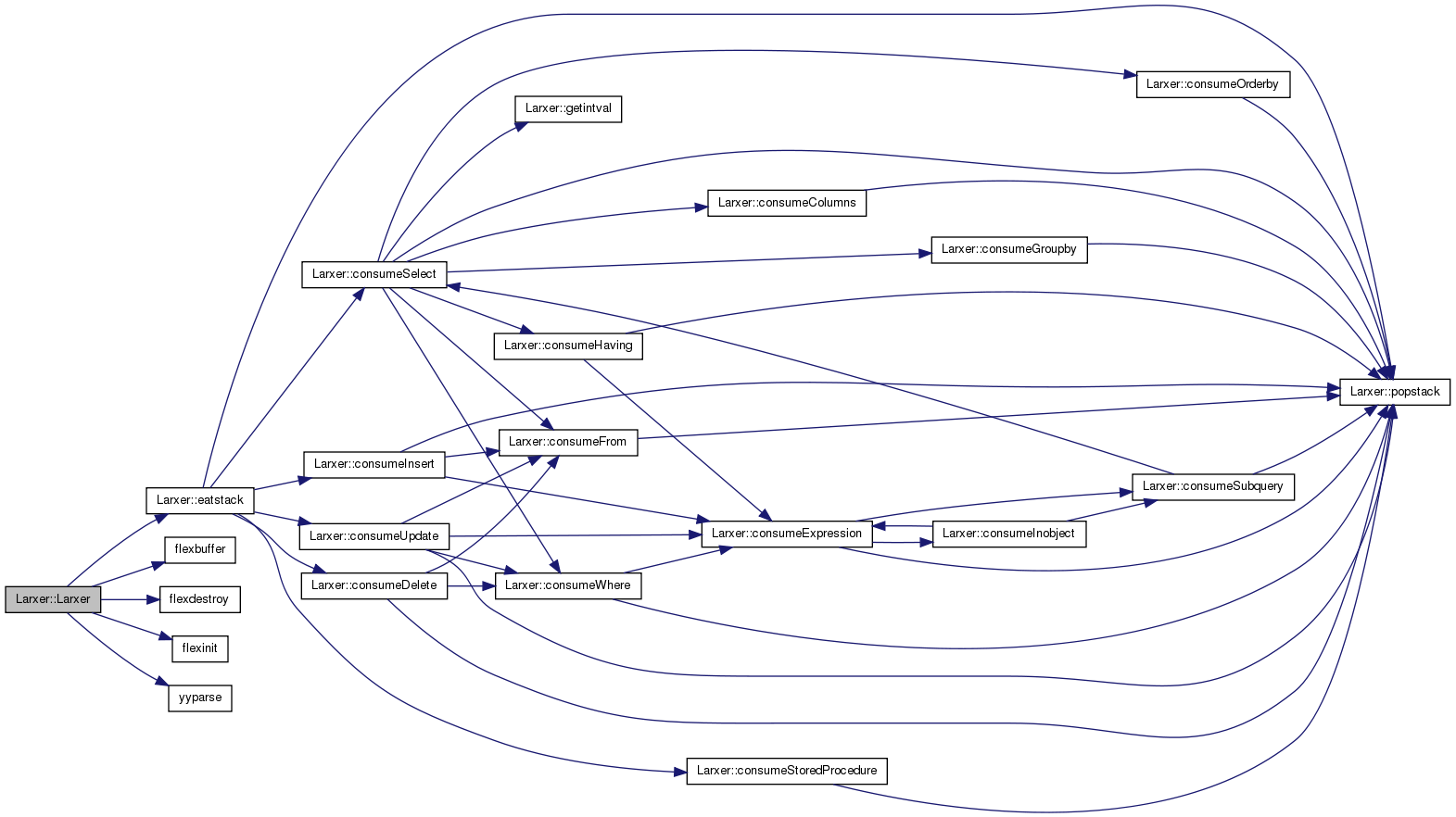
| void Larxer::consumeColumns | ( | int64_t | numcolumns) |
extract columns from stack
| numcolumns | number of columns |
Definition at line 699 of file Larxer.cc.
References currentQuery, Statement::query_s::fromColumns, parsedStack, popstack(), Larxer::stackmember_s::type, TYPE_ASTERISK, TYPE_operand, and Larxer::stackmember_s::val.
Referenced by consumeSelect().


| void Larxer::consumeDelete | ( | ) |
extract DELETE query from stack
Definition at line 678 of file Larxer.cc.
References CMD_DELETE, consumeFrom(), consumeWhere(), currentQuery, Statement::query_s::locktype, parsedStack, popstack(), Larxer::stackmember_s::type, Statement::query_s::type, TYPE_WHERE, and WRITELOCK.
Referenced by eatstack().
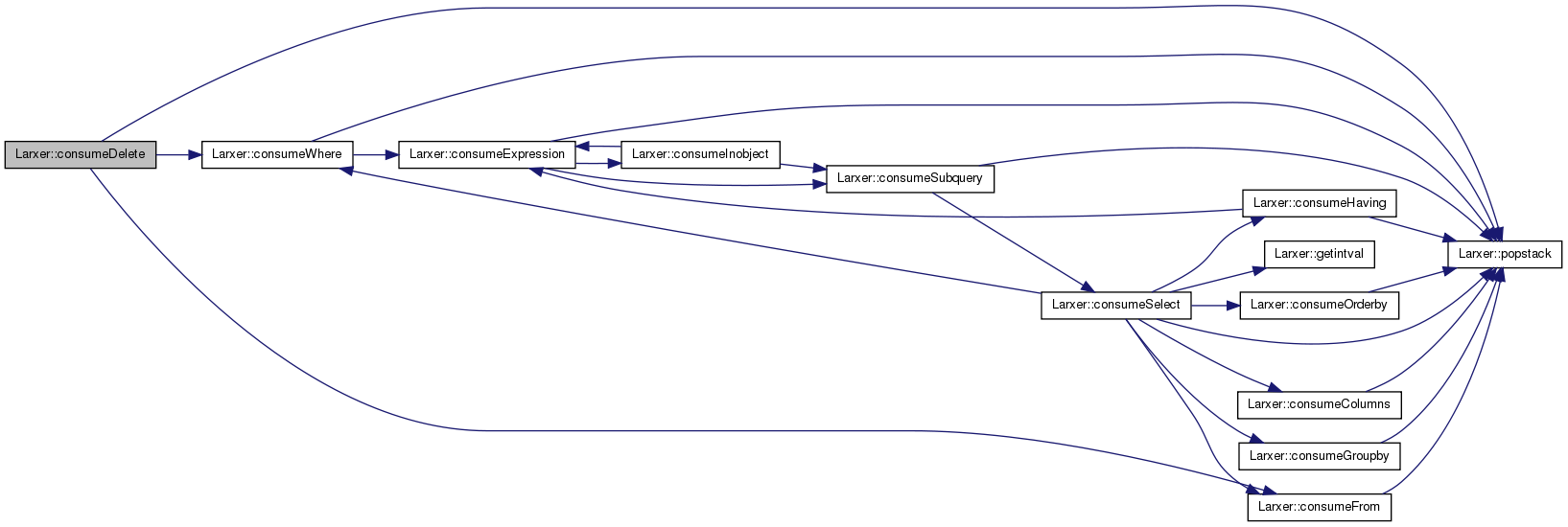

| class Ast * Larxer::consumeExpression | ( | ) |
extract expression from stack
create Ast, return its root node
Definition at line 206 of file Larxer.cc.
References consumeInobject(), consumeSubquery(), Ast::leftchild, Ast::operand, OPERAND_SUBQUERY, Ast::parent, parsedStack, popstack(), Ast::rightchild, Larxer::stackmember_s::type, TYPE_EXPRESSION, TYPE_inbegin, TYPE_inobject, TYPE_operand, and TYPE_operator.
Referenced by consumeHaving(), consumeInobject(), consumeInsert(), consumeUpdate(), and consumeWhere().
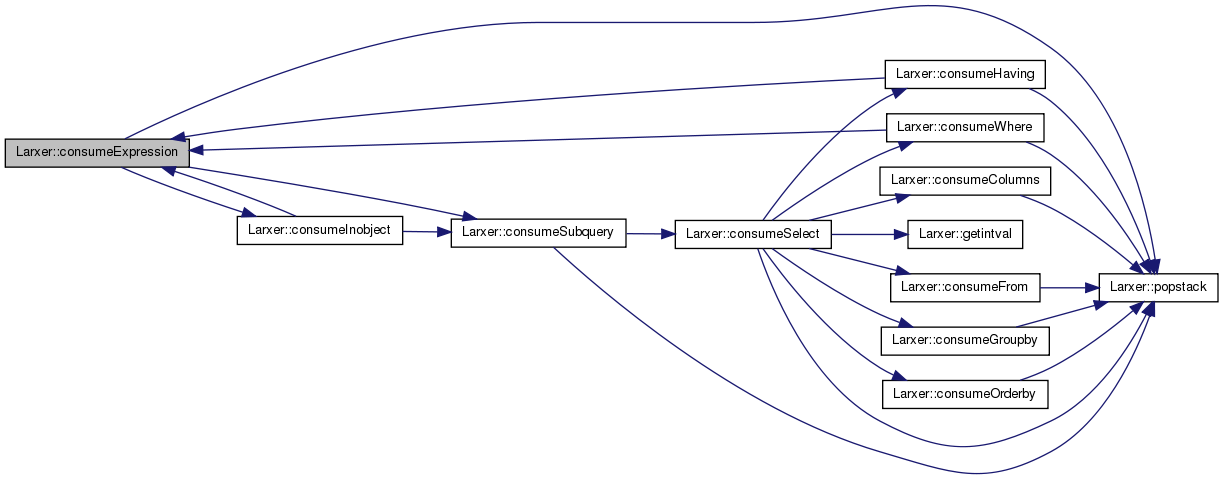

| void Larxer::consumeFrom | ( | ) |
extract FROM clause from stack
Definition at line 727 of file Larxer.cc.
References currentQuery, parsedStack, popstack(), Statement::query_s::table, Larxer::stackmember_s::type, TYPE_operand, and Larxer::stackmember_s::val.
Referenced by consumeDelete(), consumeInsert(), consumeSelect(), and consumeUpdate().


| void Larxer::consumeGroupby | ( | ) |
extract GROUP BY clause from stack
Definition at line 771 of file Larxer.cc.
References currentQuery, Statement::query_s::groupByList, Statement::query_s::hasgroupby, OPERAND_IDENTIFIER, parsedStack, popstack(), Larxer::stackmember_s::type, TYPE_operand, and Larxer::stackmember_s::val.
Referenced by consumeSelect().


| void Larxer::consumeHaving | ( | ) |
extract HAVING clause from stack
Definition at line 800 of file Larxer.cc.
References consumeExpression(), currentQuery, Statement::query_s::hashaving, parsedStack, popstack(), Statement::query_s::searchCondition, Larxer::stackmember_s::type, and TYPE_search_condition.
Referenced by consumeSelect().
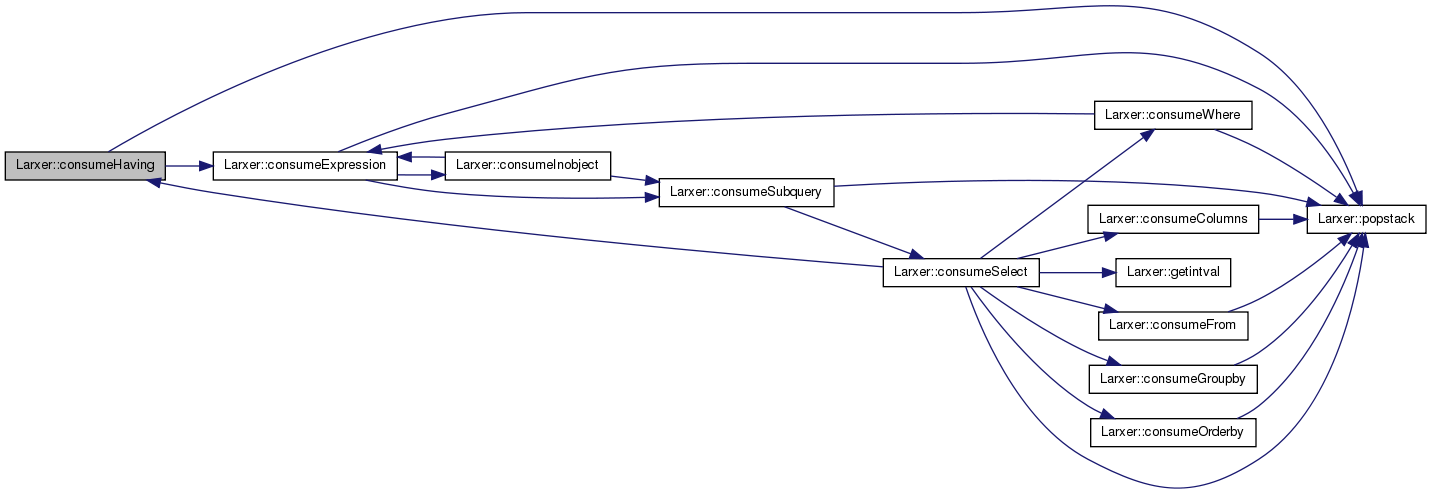

| void Larxer::consumeInobject | ( | ) |
extract list of IN values from stack
Definition at line 352 of file Larxer.cc.
References consumeExpression(), consumeSubquery(), currentQuery, Statement::inobject_s::expressionlist, Statement::query_s::inobject, Statement::inobject_s::issubquery, parsedStack, Statement::inobject_s::subquery, TYPE_EXPRESSION, and TYPE_SUBQUERY.
Referenced by consumeExpression().
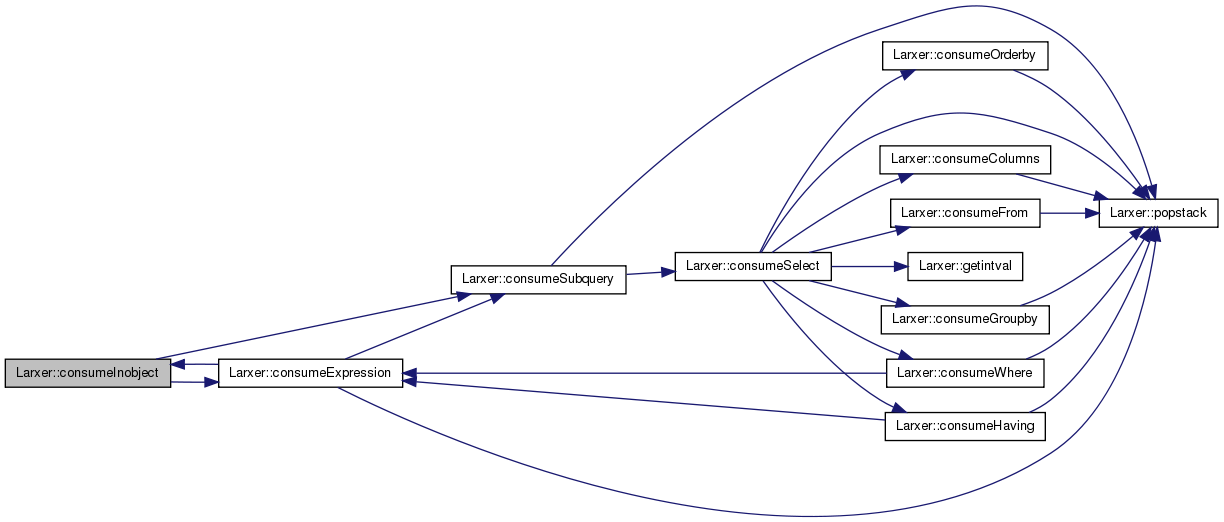

| void Larxer::consumeInsert | ( | ) |
extract INSERT query from stack
Definition at line 627 of file Larxer.cc.
References CMD_INSERT, consumeExpression(), consumeFrom(), currentQuery, Statement::query_s::insertColumns, Statement::query_s::locktype, parsedStack, popstack(), Larxer::stackmember_s::type, Statement::query_s::type, TYPE_EXPRESSION, and WRITELOCK.
Referenced by eatstack().
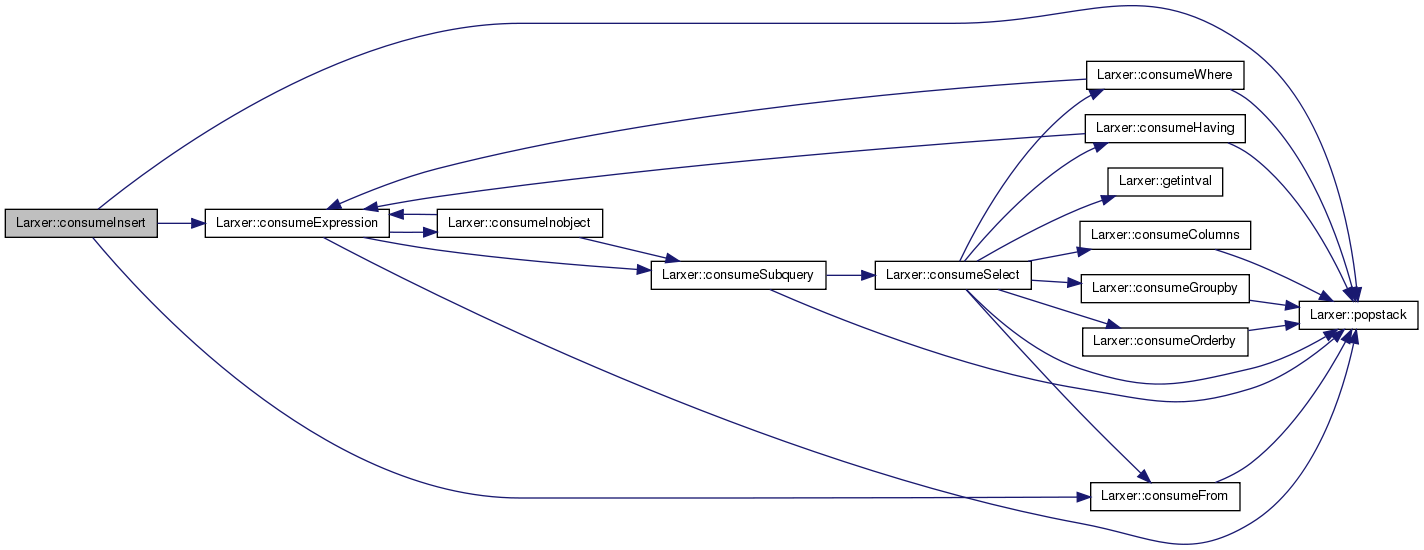

| void Larxer::consumeOrderby | ( | ) |
extract ORDER BY clause from stack
Definition at line 823 of file Larxer.cc.
References currentQuery, Statement::query_s::hasorderby, Statement::query_s::orderbylist, parsedStack, popstack(), Larxer::stackmember_s::type, TYPE_ASC, TYPE_SORTSPECIFICATION, and Larxer::stackmember_s::val.
Referenced by consumeSelect().


| void Larxer::consumeSelect | ( | string & | columns) |
extract SELECT query from stack
| columns | quantity of columns |
Definition at line 565 of file Larxer.cc.
References CMD_SELECT, consumeColumns(), consumeFrom(), consumeGroupby(), consumeHaving(), consumeOrderby(), consumeWhere(), currentQuery, getintval(), Statement::query_s::hasnolock, Statement::query_s::isforupdate, Statement::query_s::locktype, NOLOCK, parsedStack, popstack(), READLOCK, Larxer::stackmember_s::type, Statement::query_s::type, TYPE_COLUMNS, TYPE_FORUPDATE, TYPE_FROM, TYPE_GROUPBY, TYPE_HAVING, TYPE_NOLOCK, TYPE_ORDERBY, TYPE_WHERE, and WRITELOCK.
Referenced by consumeSubquery(), and eatstack().
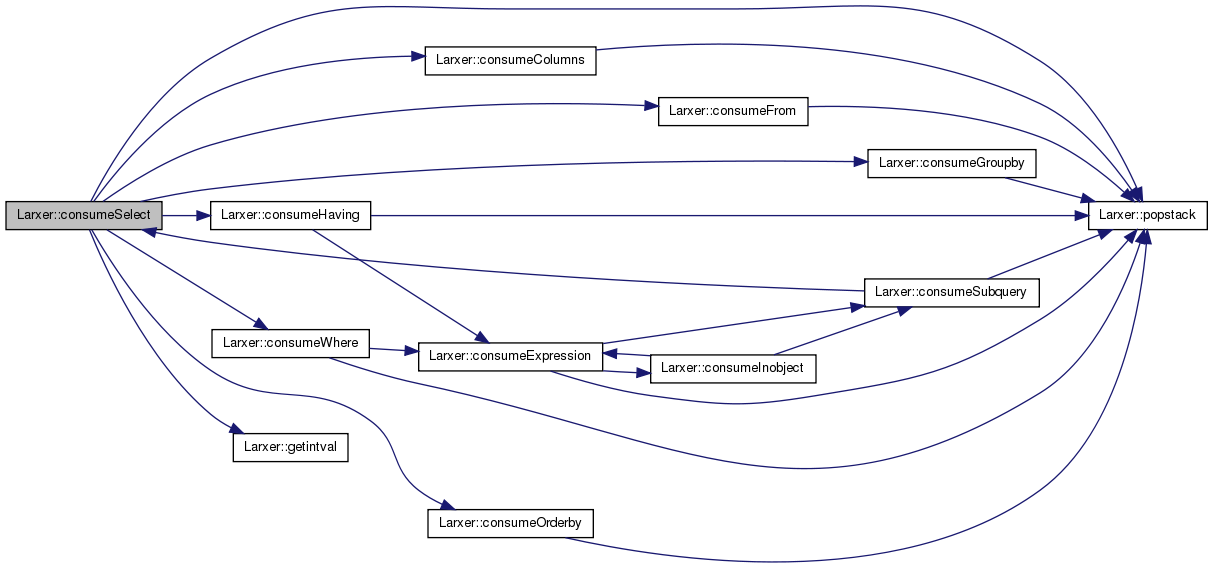

| void Larxer::consumeStoredProcedure | ( | ) |
extract stored procedure call query from stack
Definition at line 851 of file Larxer.cc.
References CMD_STOREDPROCEDURE, currentQuery, parsedStack, popstack(), Statement::query_s::storedProcedure, Statement::query_s::storedProcedureArgs, Statement::query_s::type, and Larxer::stackmember_s::val.
Referenced by eatstack().


| int64_t Larxer::consumeSubquery | ( | ) |
extract subquery from stack
Definition at line 330 of file Larxer.cc.
References consumeSelect(), currentQuery, Statement::query_s::instance, popstack(), Statement::queries, statementPtr, Larxer::stackmember_s::type, TYPE_SELECT, and Larxer::stackmember_s::val.
Referenced by consumeExpression(), and consumeInobject().
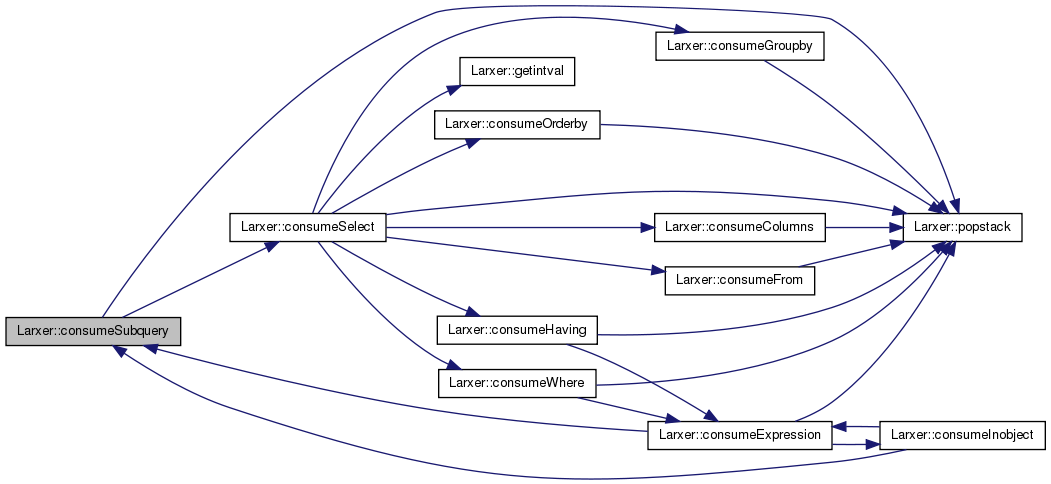

| void Larxer::consumeUpdate | ( | ) |
extract UPDATE query from stack
Definition at line 648 of file Larxer.cc.
References Statement::query_s::assignments, CMD_UPDATE, consumeExpression(), consumeFrom(), consumeWhere(), currentQuery, Statement::query_s::locktype, parsedStack, popstack(), Larxer::stackmember_s::type, Statement::query_s::type, TYPE_assignment, TYPE_WHERE, Larxer::stackmember_s::val, and WRITELOCK.
Referenced by eatstack().
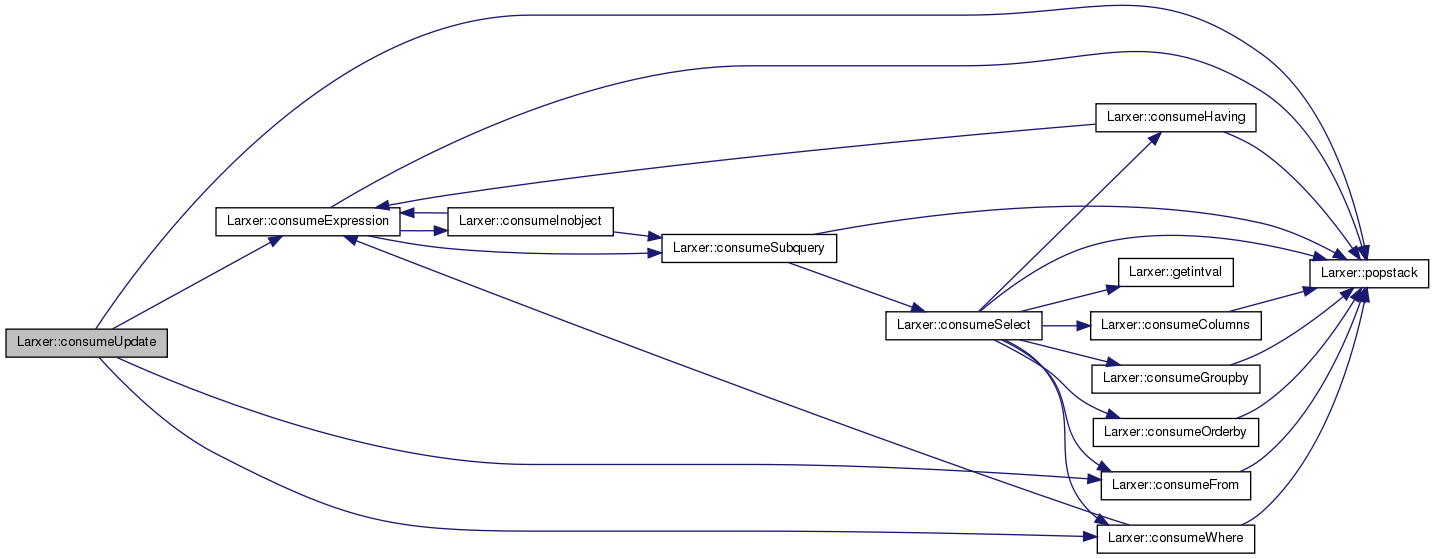

| void Larxer::consumeWhere | ( | ) |
extract WHERE clause from stack
Definition at line 748 of file Larxer.cc.
References consumeExpression(), currentQuery, Statement::query_s::haswhere, parsedStack, popstack(), Statement::query_s::searchCondition, Larxer::stackmember_s::type, and TYPE_search_condition.
Referenced by consumeDelete(), consumeSelect(), and consumeUpdate().
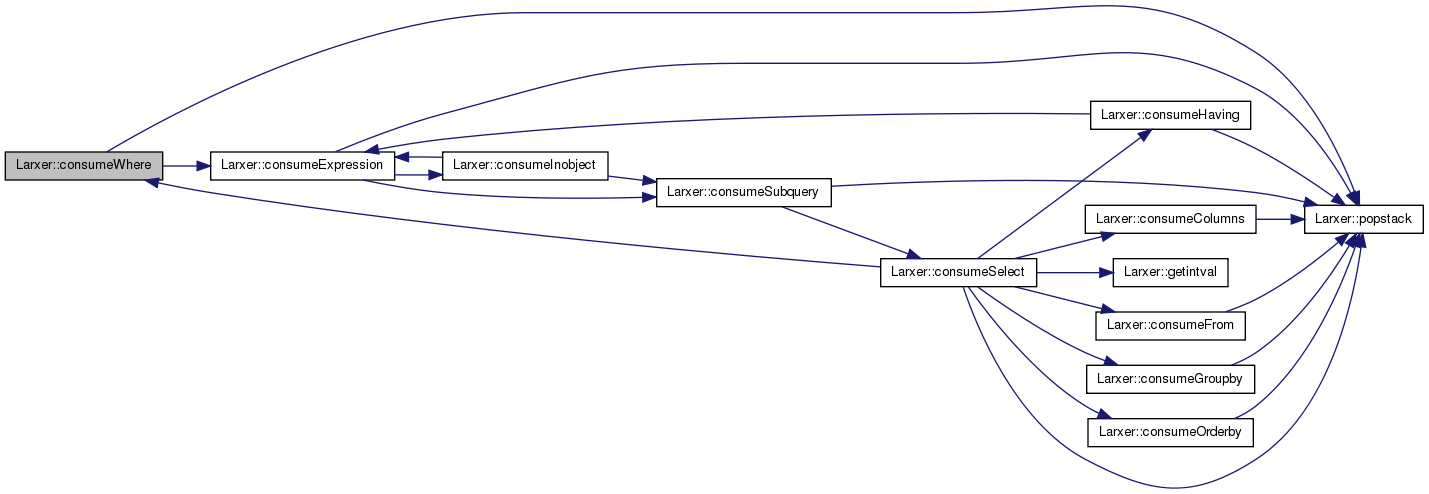

| void Larxer::eatstack | ( | class TransactionAgent * | taPtr, |
| class Schema * | schemaPtr | ||
| ) |
consume entire stack
| taPtr | TransactionAgent |
| schemaPtr | Schema |
Definition at line 154 of file Larxer.cc.
References CMD_BEGIN, CMD_COMMIT, CMD_ROLLBACK, consumeDelete(), consumeInsert(), consumeSelect(), consumeStoredProcedure(), consumeUpdate(), currentQuery, Statement::query_s::instance, parsedStack, popstack(), Statement::queries, statementPtr, Larxer::stackmember_s::type, Statement::query_s::type, TYPE_BEGIN, TYPE_COMMIT, TYPE_DELETE, TYPE_INSERT, TYPE_ROLLBACK, TYPE_SELECT, TYPE_storedprocedure, TYPE_UPDATE, and Larxer::stackmember_s::val.
Referenced by Larxer().
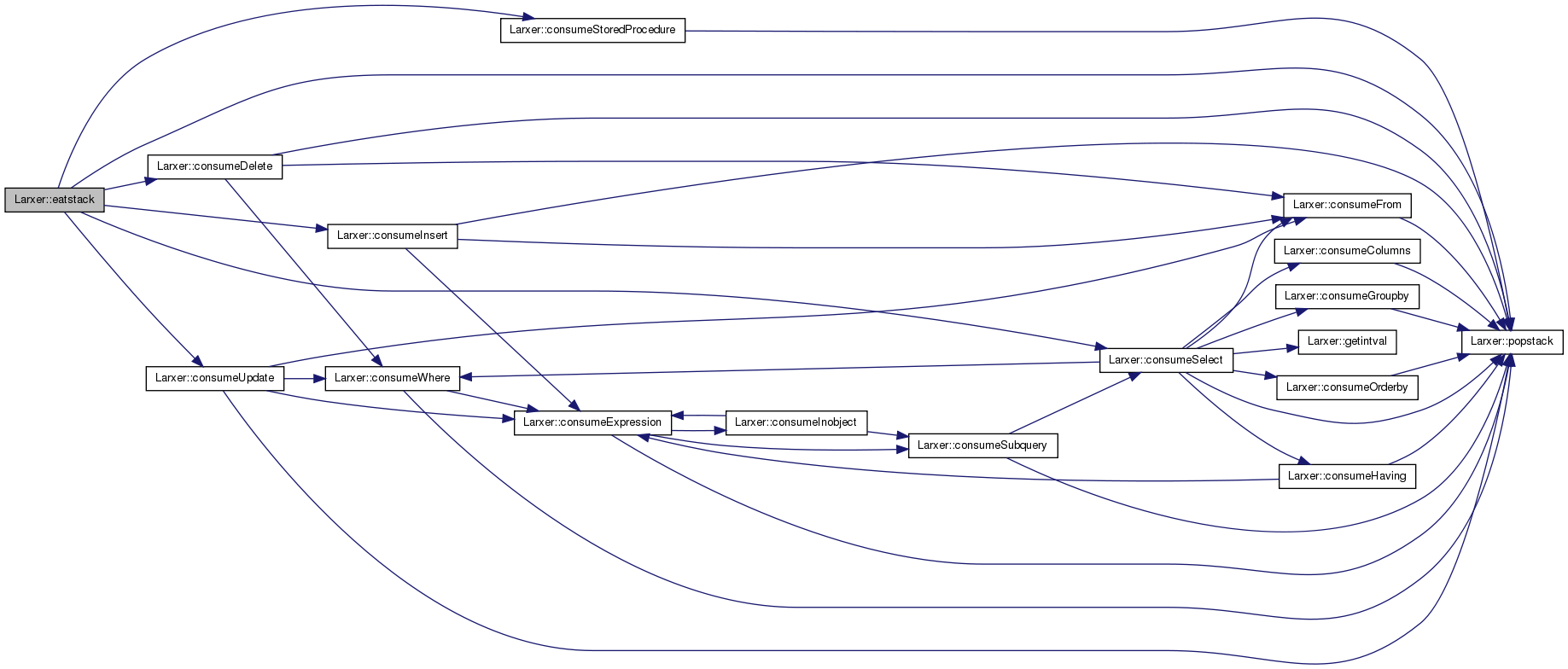

| long double Larxer::getfloatval | ( | string & | val) |
| int64_t Larxer::getintval | ( | string & | val) |
convert string to integer
| val | string input |
Definition at line 140 of file Larxer.cc.
Referenced by consumeSelect().

| Larxer::stackmember_s Larxer::popstack | ( | ) |
take item off stack
Definition at line 133 of file Larxer.cc.
References parsedStack.
Referenced by consumeColumns(), consumeDelete(), consumeExpression(), consumeFrom(), consumeGroupby(), consumeHaving(), consumeInsert(), consumeOrderby(), consumeSelect(), consumeStoredProcedure(), consumeSubquery(), consumeUpdate(), consumeWhere(), and eatstack().
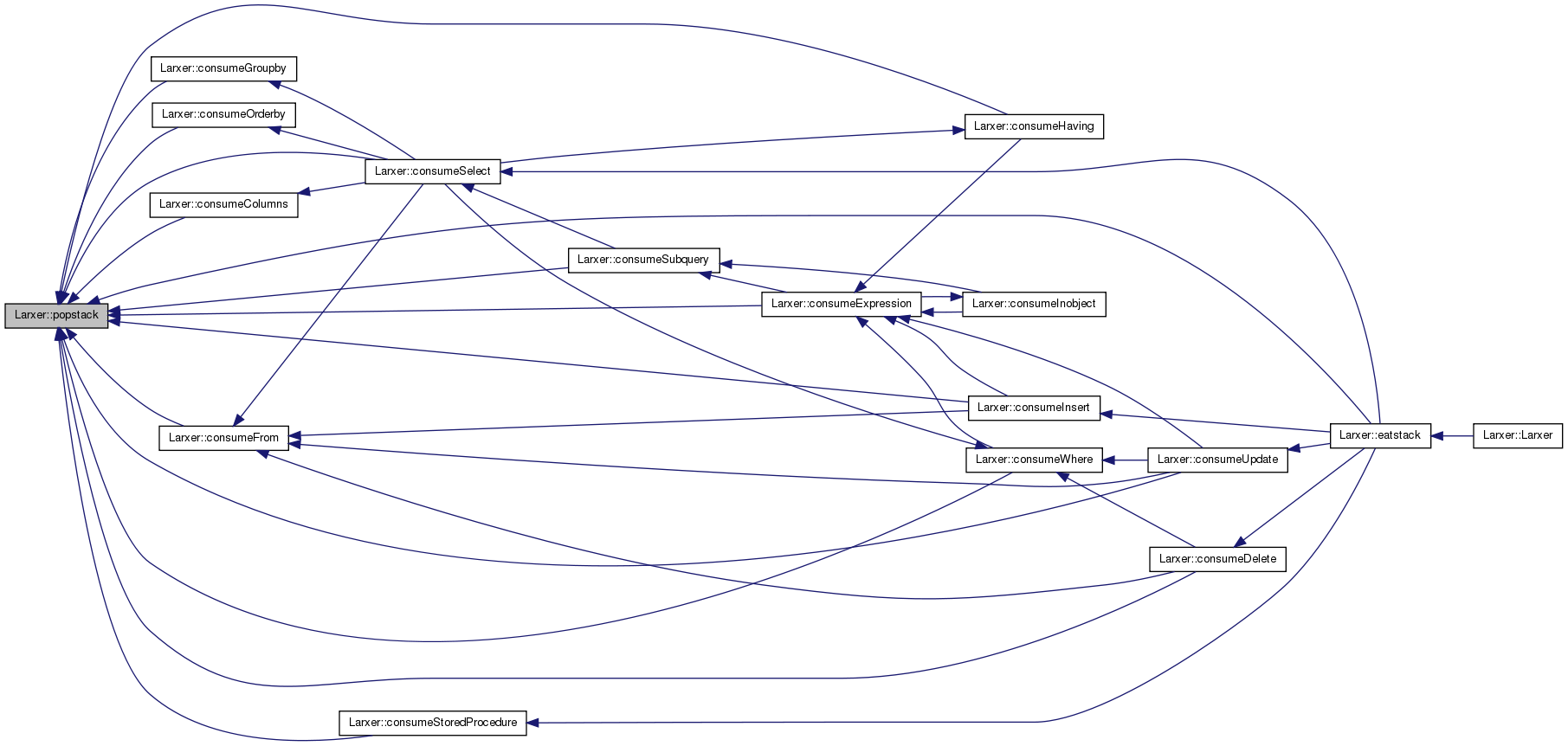
| void Larxer::printstack | ( | ) |
show stack entries, for debugging
Definition at line 373 of file Larxer.cc.
References OPERAND_BOOLEAN, OPERAND_FLOAT, OPERAND_IDENTIFIER, OPERAND_INTEGER, OPERAND_PARAMETER, OPERAND_STRING, OPERAND_SUBQUERY, OPERATOR_ADDITION, OPERATOR_AND, OPERATOR_BETWEEN, OPERATOR_BETWEENAND, OPERATOR_CONCATENATION, OPERATOR_DIVISION, OPERATOR_EQ, OPERATOR_EXISTS, OPERATOR_FALSE, OPERATOR_GT, OPERATOR_GTE, OPERATOR_IN, OPERATOR_ISNULL, OPERATOR_LIKE, OPERATOR_LT, OPERATOR_LTE, OPERATOR_MULTIPLICATION, OPERATOR_NE, OPERATOR_NEGATION, OPERATOR_NONE, OPERATOR_NOT, OPERATOR_OR, OPERATOR_SUBTRACTION, OPERATOR_TRUE, OPERATOR_UNIQUE, OPERATOR_UNKNOWN, parsedStack, TYPE_operand, and TYPE_operator.
| void Larxer::pushaggregate | ( | char | aggregatetype, |
| const char * | val | ||
| ) |
push aggregate and associated field onto stack
| aggregatetype | type of aggregate |
| val | associated field |
Definition at line 124 of file Larxer.cc.
References OPERAND_AGGREGATE, pushstack(), and TYPE_operand.

| void Larxer::pushoperand | ( | char | operandtype) |
push operand onto stack
| operandtype | type of operand |
Definition at line 94 of file Larxer.cc.
References pushstack(), and TYPE_operand.

| void Larxer::pushoperand | ( | char | operandtype, |
| int64_t | val | ||
| ) |
push operand onto stack
| operandtype | type of operand |
| val | associated value |
Definition at line 100 of file Larxer.cc.
References pushstack(), and TYPE_operand.

| void Larxer::pushoperand | ( | char | operandtype, |
| long double | val | ||
| ) |
push operand onto stack
| operandtype | type of operand |
| val | associated value |
Definition at line 108 of file Larxer.cc.
References pushstack(), and TYPE_operand.

| void Larxer::pushoperand | ( | char | operandtype, |
| const char * | val | ||
| ) |
push operand onto stack
| operandtype | type of operand |
| val | associated value |
Definition at line 116 of file Larxer.cc.
References pushstack(), and TYPE_operand.

| void Larxer::pushstack | ( | stacktypes_e | type) |
put item on stack
stack is intermediary between parsing and Statement object
| type | stack entry |
Definition at line 63 of file Larxer.cc.
References parsedStack.
Referenced by pushaggregate(), and pushoperand().

| void Larxer::pushstack | ( | stacktypes_e | type, |
| int64_t | val | ||
| ) |
put item on stack
stack is intermediary between parsing and Statement object
| type | stack entry |
| val | value associated with entry |
Definition at line 69 of file Larxer.cc.
References parsedStack.
| void Larxer::pushstack | ( | stacktypes_e | type, |
| long double | val | ||
| ) |
put item on stack
stack is intermediary between parsing and Statement object
| type | stack entry |
| val | value associated with entry |
Definition at line 76 of file Larxer.cc.
References parsedStack.
| void Larxer::pushstack | ( | stacktypes_e | type, |
| const char * | val | ||
| ) |
put item on stack
stack is intermediary between parsing and Statement object
| type | stack entry |
| val | value associated with entry |
Definition at line 84 of file Larxer.cc.
References parsedStack.
| void Larxer::pushstack | ( | stacktypes_e | type, |
| string & | val | ||
| ) |
put item on stack
stack is intermediary between parsing and Statement object
| type | stack entry |
| val | value associated with entry |
Definition at line 89 of file Larxer.cc.
References parsedStack.
| class Statement::query_s* Larxer::currentQuery |
Definition at line 345 of file Larxer.h.
Referenced by consumeColumns(), consumeDelete(), consumeFrom(), consumeGroupby(), consumeHaving(), consumeInobject(), consumeInsert(), consumeOrderby(), consumeSelect(), consumeStoredProcedure(), consumeSubquery(), consumeUpdate(), consumeWhere(), and eatstack().
| std::stack<stackmember_s> Larxer::parsedStack |
Definition at line 344 of file Larxer.h.
Referenced by consumeColumns(), consumeDelete(), consumeExpression(), consumeFrom(), consumeGroupby(), consumeHaving(), consumeInobject(), consumeInsert(), consumeOrderby(), consumeSelect(), consumeStoredProcedure(), consumeUpdate(), consumeWhere(), eatstack(), Larxer(), popstack(), printstack(), and pushstack().
| class Statement* Larxer::statementPtr |
Definition at line 346 of file Larxer.h.
Referenced by TransactionAgent::compile(), consumeSubquery(), Pg::cont(), eatstack(), Pg::executeStatement(), Larxer(), and TransactionAgent::newstatement().